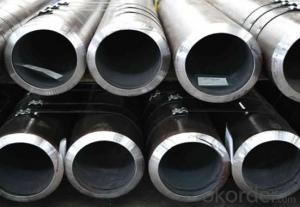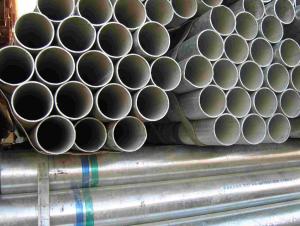Seamless Steel Pipe of Top Supplier
- Loading Port:
- Qingdao
- Payment Terms:
- TT or LC
- Min Order Qty:
- 2000 PCS
- Supply Capability:
- 30000 PCS/month
OKorder Service Pledge
OKorder Financial Service
You Might Also Like
OKorder is offering high quality Seamless Steel Pipe at great prices with worldwide shipping. Our supplier is a world-class manufacturer of steel pipe, with our products utilized the world over. OKorder annually supplies products to European, North American and Asian markets. We provide quotations within 24 hours of receiving an inquiry and guarantee competitive prices.
Product Applications:
Seamless Steel Pipe is ideal for long distance oil, gas, and natural gas pipelines on land and offshore. They can also be applied in construction projects, offshore platforms, power stations, the petrochemical industry and municipal construction.
Product Advantages:
OKorder's Steel Pipe is durable, resists corrosion and is recyclable.
Main Product Features:
· Premium quality
· Prompt delivery & seaworthy packing (30 days after receiving deposit)
· Corrosion resistance
· Professional Service
· Competitive pricing
Product Specifications:
Standard: ASTM A106, ASTM A179, ASTM A192, ASTM SA213/A519, DIN1629/EN10216-1, DIN17175/EN10216-2, DIN 2391-1, API SPEC 5CT
Certification: MTC, ISO, API
Dimensions:
Nom. Thickness: 14mm – 325mm (Sch5s to XXS)
Wall Thickness: 1mm – 80mm
Length: 20'' – 24''
Packaging: Bundle, beveled or plain end, varnish, PVC end caps
FAQ:
Q1: Why buy Materials & Equipment from OKorder.com?
A1: All products offered byOKorder.com are carefully selected from China's most reliable manufacturing enterprises. Through its ISO certifications, OKorder.com adheres to the highest standards and a commitment to supply chain safety and customer satisfaction.
Q2: How do we guarantee the quality of our products?
A2: We have established an advanced quality management system which conducts strict quality tests at every step, from raw materials to the final product. At the same time, we provide extensive follow-up service assurances as required.
Q3: How soon can we receive the product after purchase?
A3: Within three days of placing an order, we will begin production. The specific shipping date is dependent upon international and government factors, but is typically 7 to 10 workdays.
Q4: What makes stainless steel stainless?
A4: Stainless steel must contain at least 10.5 % chromium. It is this element that reacts with the oxygen in the air to form a complex chrome-oxide surface layer that is invisible but strong enough to prevent further oxygen from "staining" (rusting) the surface. Higher levels of chromium and the addition of other alloying elements such as nickel and molybdenum enhance this surface layer and improve the corrosion resistance of the stainless material.
Q5: Can stainless steel rust?
A5: Stainless does not "rust" as you think of regular steel rusting with a red oxide on the surface that flakes off. If you see red rust it is probably due to some iron particles that have contaminated the surface of the stainless steel and it is these iron particles that are rusting. Look at the source of the rusting and see if you can remove it from the surface.
Q6: What is the difference between galvanized steel and galvalume steel?
A6: Galvanized steel is metallic coated with Zinc in various coating weights. Minimum recommended for painted metal roofs is G90. Galvalume is a zinc and aluminum coated steel that becomes an alloy and is recommended in either painted or bare applications with a minimum coating weight of AZ50. Galvalume has an excellent performance life in bare exposures. Hence if you are using a bare panel use galvalume and if painted use either.
Q7: Is there a difference in thermal conductivity between stainless steel and steel?
A6: Yes. Stainless Steel has a lower thermal conductivity rate than steel; approximately 1/3 to 1/5th depending on the material.
Q8: Is there a difference in electrical conductivity between stainless steel and steel?
A8: Yes. Steel is generally more conductive than stainless steel. Steel has resistivity in the range of 10~20Ωm, while stainless has a resistivity of approximately 60~72Ωm.
Images:
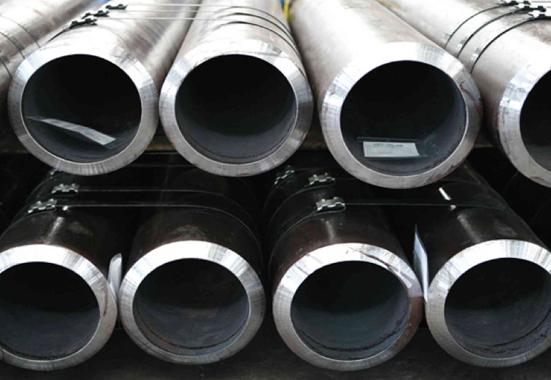
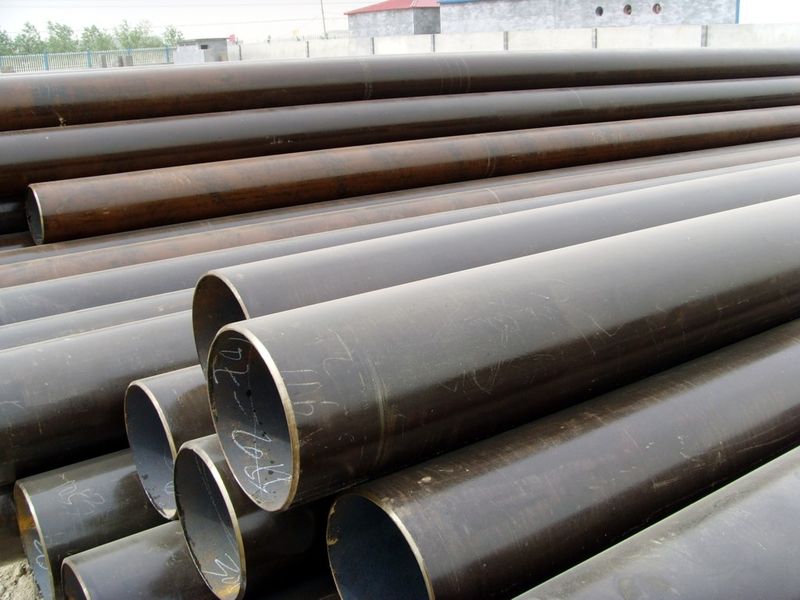
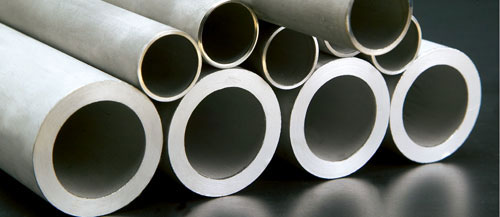
- Q:What are the different types of steel pipe caps?
- There are several different types of steel pipe caps, including threaded caps, socket weld caps, butt weld caps, and flanged caps.
- Q:What are the different surface finishes available for steel pipes?
- There are several different surface finishes available for steel pipes, including mill finish, galvanized finish, painted finish, and polished finish.
- Q:Can steel pipes be used for hydronic heating systems?
- Yes, steel pipes can be used for hydronic heating systems. Steel pipes are commonly used in hydronic heating systems due to their durability, strength, and ability to withstand high temperatures and pressures. They are also resistant to corrosion, making them suitable for long-term use in these systems.
- Q:How are steel pipes used in the mining and mineral processing industry?
- Steel pipes are commonly used in the mining and mineral processing industry for various purposes such as transporting liquids, gases, and slurries, as well as providing structural support for mining infrastructure. These pipes are highly durable and resistant to corrosion, making them suitable for harsh and demanding environments. They are used for tasks such as transporting water for mining operations, carrying tailings and waste materials, and conveying mining chemicals. Additionally, steel pipes are utilized in the construction of mine shafts, tunnels, and processing plants, providing a strong and reliable framework for mining operations.
- Q:Can steel pipes be used for underwater applications?
- Yes, steel pipes can be used for underwater applications. Steel is a strong and durable material that can withstand the harsh conditions of underwater environments, making it suitable for various applications such as offshore oil and gas exploration, underwater construction, and marine infrastructure. Additionally, steel pipes can be coated with protective layers to prevent corrosion and ensure long-term performance underwater.
- Q:Can steel pipes be used for chemical storage tanks?
- Steel pipes can be used for chemical storage tanks, but it depends on the specific application and the type of chemicals being stored. Steel is generally a strong and durable material, making it suitable for many industrial applications. However, certain chemicals can react with steel, causing corrosion and potentially compromising the integrity of the tank. In such cases, it is important to use corrosion-resistant coatings or linings on the steel pipes to protect against chemical reactions. Additionally, the design and construction of the tank should adhere to industry standards and regulations to ensure safe storage of chemicals. Therefore, while steel pipes can be used for chemical storage tanks, careful consideration must be given to the type of chemicals being stored and appropriate measures taken to prevent corrosion and ensure safety.
- Q:What are the typical lengths of steel pipes?
- The typical lengths of steel pipes vary depending on their intended use and application. However, common lengths for steel pipes range from 18 to 24 feet (5.5 to 7.3 meters).
- Q:How are steel pipes used in the construction of oil-fired power plants?
- Steel pipes are primarily used in the construction of oil-fired power plants for transporting oil and gas, as well as for the construction of boilers and other high-pressure equipment. These pipes are durable, resistant to corrosion, and can withstand high temperatures and pressures, making them suitable for the harsh conditions and demands of power plant operations.
- Q:What are the safety precautions to follow when working with steel pipes?
- When working with steel pipes, it is important to follow several safety precautions to prevent accidents and injuries. Some key precautions include wearing appropriate personal protective equipment such as gloves, safety glasses, and steel-toed boots to protect against potential hazards. It is also crucial to inspect the pipes for any damage or defects before using them and ensure they are properly secured and supported during installation. Additionally, workers should use caution when handling heavy or sharp-edged pipes and use proper lifting techniques to prevent strains or sprains. Following safety protocols, including using the correct tools and equipment, practicing good housekeeping, and staying alert and focused, is essential to minimize risks and maintain a safe working environment.
- Q:What are the safety precautions when working with steel pipes?
- When working with steel pipes, some important safety precautions to follow include wearing appropriate personal protective equipment (PPE) such as gloves, safety glasses, and steel-toed boots to protect against potential injuries. Additionally, it is essential to ensure proper ventilation in the work area to prevent the accumulation of hazardous fumes or gases. Using the correct tools and equipment, such as pipe wrenches and clamps, and following proper lifting techniques are crucial to avoid strains or back injuries. Regular inspection and maintenance of the pipes and equipment are also necessary to prevent any potential accidents. Lastly, it is important to receive proper training and follow established safety procedures to minimize risks and promote a safe working environment.
1. Manufacturer Overview |
|
|---|---|
| Location | |
| Year Established | |
| Annual Output Value | |
| Main Markets | |
| Company Certifications | |
2. Manufacturer Certificates |
|
|---|---|
| a) Certification Name | |
| Range | |
| Reference | |
| Validity Period | |
3. Manufacturer Capability |
|
|---|---|
| a)Trade Capacity | |
| Nearest Port | |
| Export Percentage | |
| No.of Employees in Trade Department | |
| Language Spoken: | |
| b)Factory Information | |
| Factory Size: | |
| No. of Production Lines | |
| Contract Manufacturing | |
| Product Price Range | |
Send your message to us
Seamless Steel Pipe of Top Supplier
- Loading Port:
- Qingdao
- Payment Terms:
- TT or LC
- Min Order Qty:
- 2000 PCS
- Supply Capability:
- 30000 PCS/month
OKorder Service Pledge
OKorder Financial Service
Similar products
New products
Hot products
Hot Searches
Related keywords


